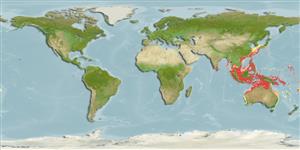Common names from other countries
>
Ovalentaria/misc (Various families in series Ovalentaria) >
Opistognathidae (Jawfishes)
Etymology: Opistognathus: Greek, opisthe = behind + Greek, gnathos = jaw (Ref. 45335); to the very elongate upper jaw of the type species of the genus, Opistognathus nigromarginatus (Ref. 128653); castelnaui: Named for the French diplomat and ichthyologist Francis-Louis de Castelnau (1812-1880)..
More on author: Bleeker.
Environment: milieu / climate zone / depth range / distribution range
Ecologia
marino demersale; distribuzione batimetrica 20 - 100 m (Ref. 559). Tropical
Indo-West Pacific: eastern Australia to the Ryukyus, Taiwan, Philippines, Malaysia, and Indonesia.
Size / Peso / Age
Maturity: Lm ? range ? - ? cm
Max length : 25.0 cm SL maschio/sesso non determinato; (Ref. 559)
Spine dorsali (totale): 11; Raggi dorsali molli (totale): 14; Spine anali 3; Raggi anali molli: 14; Vertebre: 28. This species is distinguished by the following characters: elongated supramaxilla and posterior end of maxilla produced as a thin flexible lamina; upper jaw's inner lining and adjacent membranes with one or two conspicuous black stripes; dorsal half of dorsal fin usually dark except for narrow pale margin, remainder of fin pale and often with 8 or 9 evenly spaced dark blotches that extend onto basal fourth to third of fin and slightly onto dorsum; D XI,14; body with about 90-11 0 oblique scale rows; total gill rakers 28-35 (Ref. 81517).
Inhabits open sand and rubble substrates in about 20-25 meters (Ref. 48637). May be found in depths greater than 100 m (Ref. 559). Mouthbrooders (Ref. 240).
Life cycle and mating behavior
Maturità | Riproduzione | Deposizione | Uova | Fecundity | Larve
Employ mouthbrooding to care for their young (Ref. 240).
Smith-Vaniz, W.F., 2023. Review of Indo-West Pacific jawfishes (Opistognathus: Opistognathidae), with descriptions of 18 new species. Zootaxa 5252(1):1-180. (Ref. 128653)
IUCN Red List Status (Ref. 130435)
CITES (Ref. 128078)
Not Evaluated
Threat to humans
Harmless
Human uses
Informazioni ulteriori
BibliografiaAcquacolturaProfilo di acquacolturaVarietàGeneticaElectrophoresesEreditarietàMalattieElaborazioneMass conversion
CollaboratoriImmaginiStamps, Coins Misc.SuoniCiguateraVelocitàModalità di nuotoArea branchialeOtolithsCervelliVista
Strumenti
Special reports
Download XML
Fonti Internet
Estimates based on models
Preferred temperature (Ref.
115969): 24.1 - 28.5, mean 27.5 (based on 554 cells).
Phylogenetic diversity index (Ref.
82804): PD
50 = 0.5000 [Uniqueness, from 0.5 = low to 2.0 = high].
Bayesian length-weight: a=0.00389 (0.00180 - 0.00842), b=3.12 (2.94 - 3.30), in cm Total Length, based on all LWR estimates for this body shape (Ref.
93245).
Trophic level (Ref.
69278): 3.7 ±0.6 se; based on size and trophs of closest relatives
Fishing Vulnerability (Ref.
59153): Low vulnerability (21 of 100).
